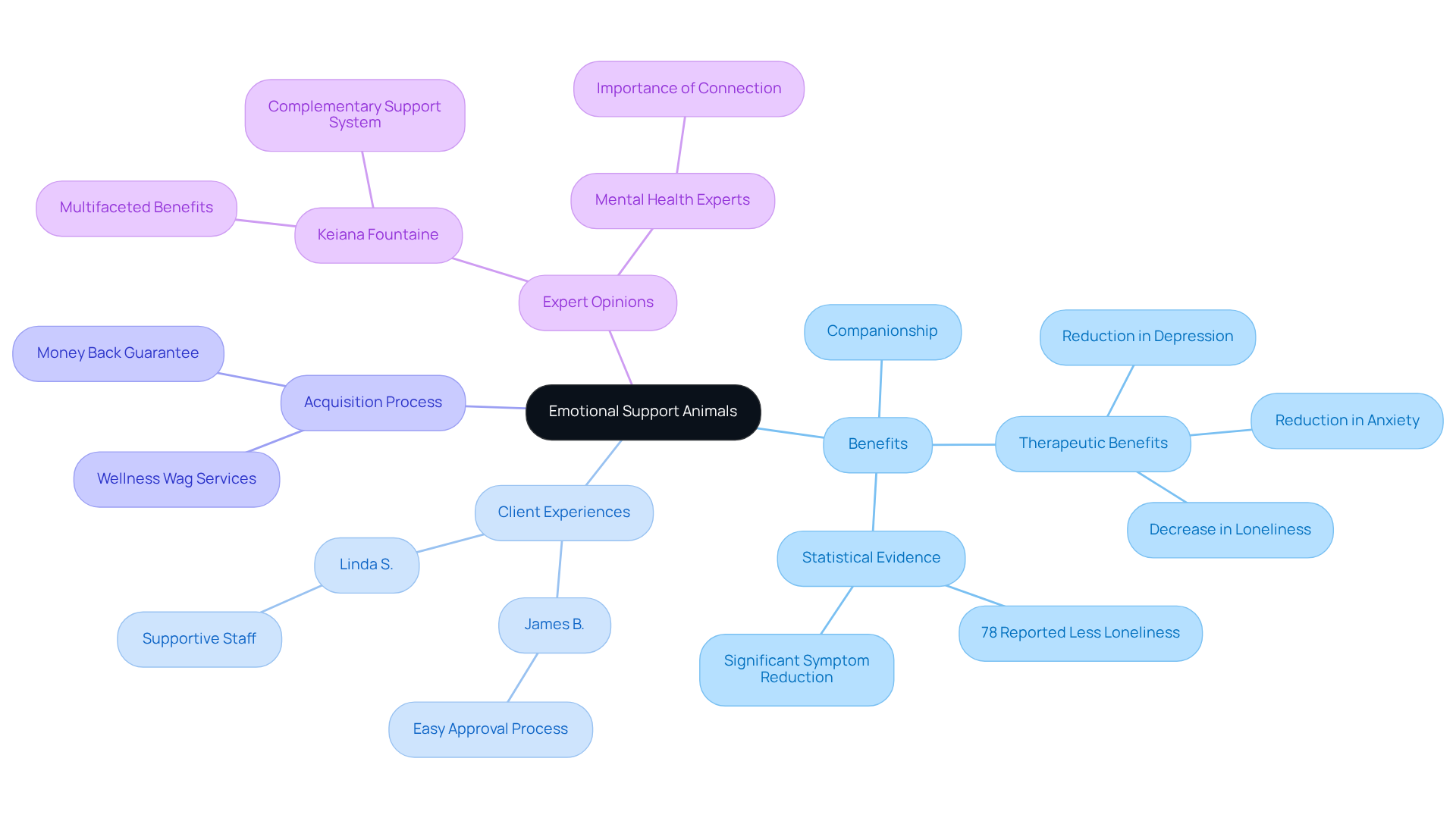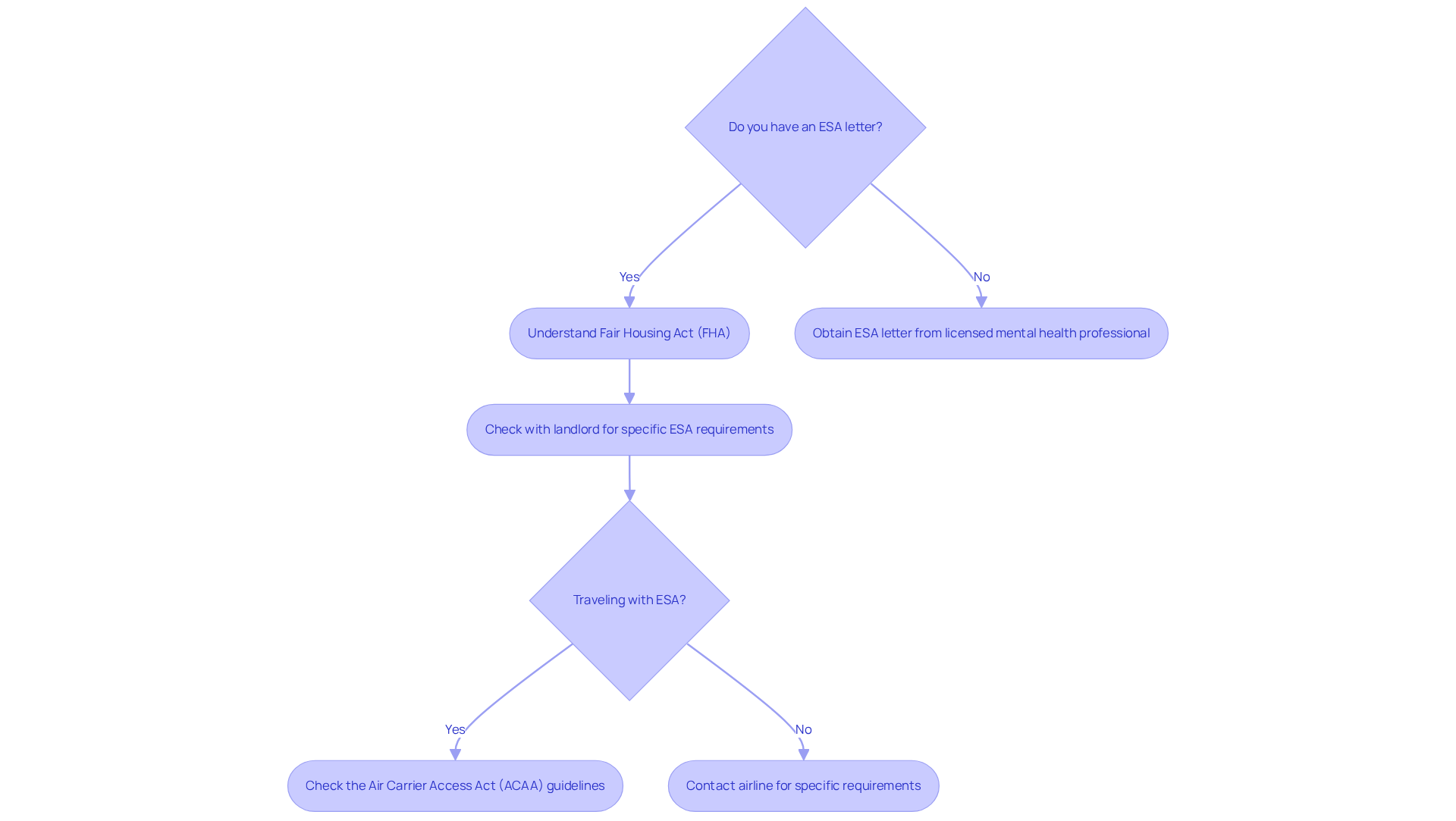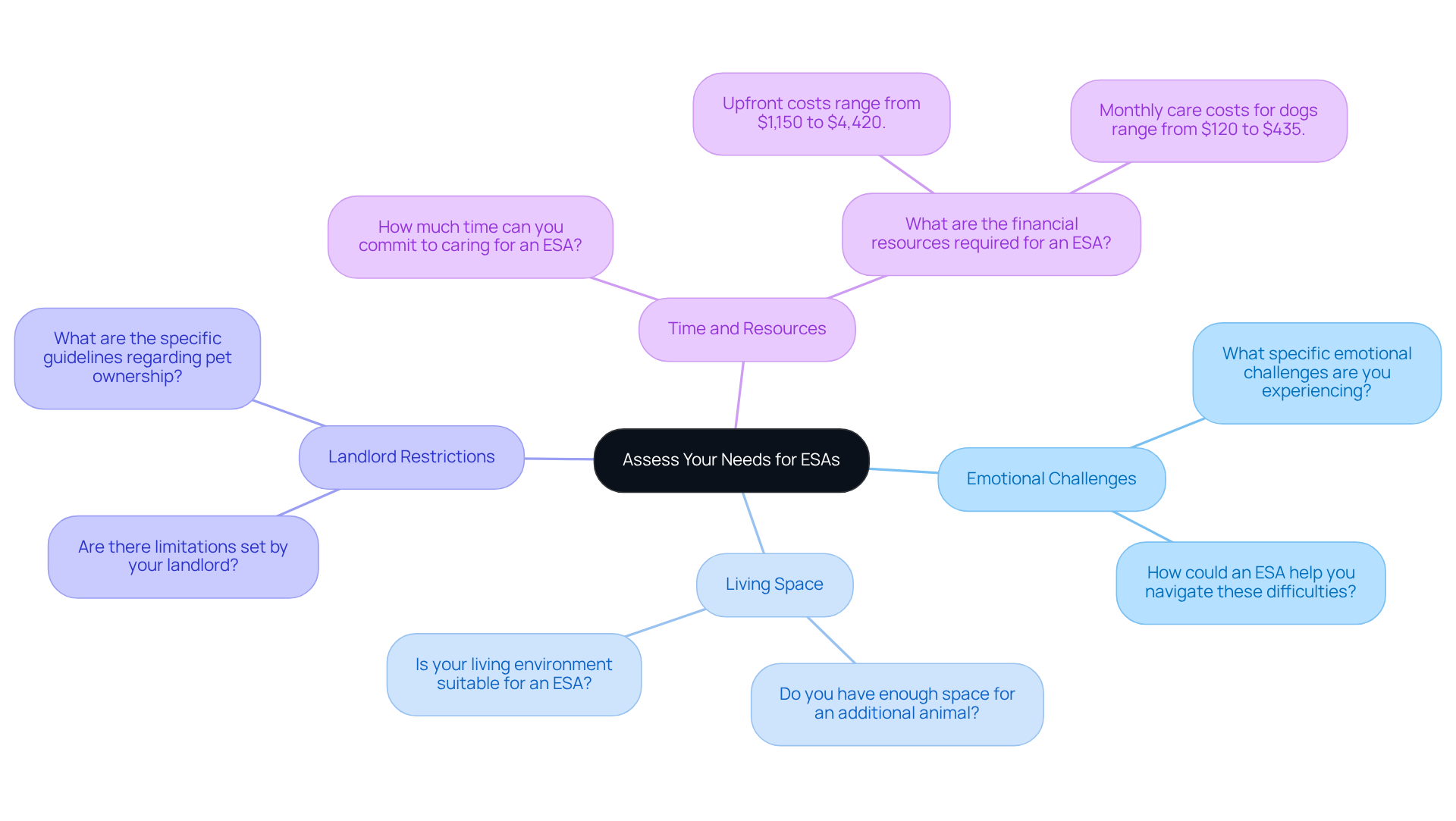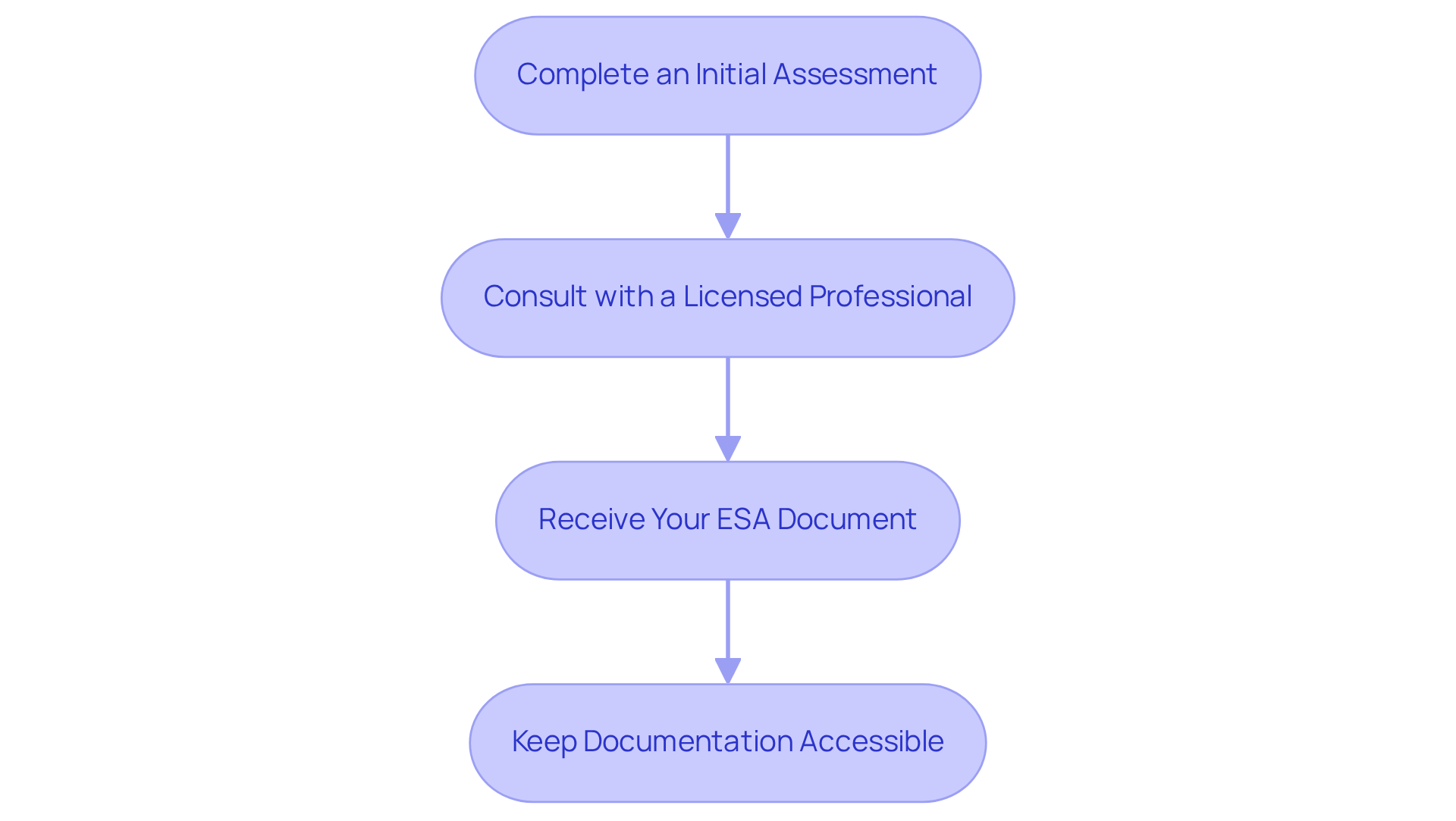

How Many ESAs Can You Have? A Step-by-Step Guide for You
by Lena Park
Last updated: September 18, 2025
Verified and Approved by:
Angela Morris,
MSW, LCSW
Fact Checked

Overview
This article explores the number of Emotional Support Animals (ESAs) a person can have, emphasizing the importance of understanding one’s emotional needs and living circumstances, as well as any restrictions that may be imposed by landlords or housing associations.
Many individuals face emotional challenges that can feel overwhelming. It’s essential to recognize these struggles and how they impact daily life. By assessing available space, financial commitments, and the need for proper documentation, individuals can thoughtfully determine how many ESAs might effectively contribute to their emotional well-being.
This consideration not only helps in making informed decisions but also fosters a sense of comfort and support.
Remember, having the right support can make a significant difference in navigating emotional challenges. If you’re feeling uncertain, know that there are compassionate solutions available, such as ESA letters, which can help affirm the need for your beloved companion. You are not alone in this journey; support is within reach.
Introduction
Understanding the intricacies of Emotional Support Animals (ESAs) is essential for individuals yearning for companionship and therapeutic benefits in their lives. These animals offer comfort and emotional stability, especially for those navigating psychological challenges. However, many are left pondering the legalities and guidelines surrounding ESA ownership.
- How many ESAs can one person have?
- What factors should be considered before welcoming another animal into their home?
This article explores the vital aspects of ESA ownership, shedding light on legal requirements, personal assessments, and the steps needed to nurture a harmonious relationship with these cherished companions.
Understand the Role of Emotional Support Animals
Emotional Support Animals play a vital role in providing companionship and therapeutic benefits to those grappling with emotional or psychological challenges. Unlike service animals, which are specially trained to perform tasks for individuals with disabilities, emotional support animals offer comfort and assistance simply through their presence. Research shows that ESAs can significantly alleviate symptoms of anxiety and depression; a study revealed that participants experienced a statistically significant reduction in these symptoms after a year of interaction with their ESAs. Additionally, 78% of participants in a recent study reported feeling less lonely after being paired with an ESA, underscoring the profound impact these animals can have on emotional well-being.
At Wellness Wag, we recognize the significance of this bond and are dedicated to facilitating the process of acquiring an ESA. Our clients have shared their heartfelt experiences, with testimonials reflecting the smooth journey they encountered while obtaining their ESA letters. For example, James B. remarked, “The approval process for my ESA was easy and hassle-free. Five stars from me!” Similarly, Linda S. shared, “Wellness Wag made getting an Emotional Support Animal a breeze. The staff was very supportive and helpful throughout the process.”
Mental health experts emphasize the importance of the connection between individuals and their emotional support animals. As Keiana Fountaine notes, “The advantages of having an ESA are multifaceted,” highlighting their role in alleviating feelings of isolation and providing psychological stability. However, it is crucial to understand that ESAs are not a substitute for professional mental health care; rather, they serve as a complementary support system. Recognizing how many ESAs you can have is essential for anyone considering adding an ESA to their life, as it involves understanding both the emotional connection and the responsibilities that come with pet ownership.
Moreover, Wellness Wag offers a Money Back Guarantee, ensuring a risk-free experience when obtaining your ESA document. If your valid ESA document does not serve its purpose for any reason, we will refund your money in full. This commitment to client satisfaction further illustrates our dedication to providing a seamless process.
In conclusion, while assistance animals can enhance mental well-being and provide comfort, they should be viewed as part of a broader mental health strategy that includes professional support. Understanding this will empower individuals to make informed decisions regarding their emotional support needs, and with the guidance of licensed experts at Wellness Wag, the process of acquiring an ESA document is simplified and supported throughout.

Explore Legal Guidelines for ESA Ownership
Understanding the legal framework for Emotional Support Animals (ESAs) is crucial for those navigating the challenges of mental health. Many individuals face emotional struggles, and the Fair Housing Act (FHA) offers protection for those with ESAs, allowing them to reside in places that typically restrict pets. With a valid ESA letter from a licensed mental health professional, individuals can demonstrate their need for emotional support, ensuring compliance with housing regulations.
However, the journey doesn’t end there. The Air Carrier Access Act (ACAA) also plays a significant role, enabling individuals to travel with their emotional support animals. It’s important to note that airline policies can differ widely, and recent changes mean that airlines are no longer obligated to allow emotional support animals to travel for free in aircraft cabins. Instead, these animals may now be treated like regular pets, which could involve fees or restrictions. Therefore, checking the specific requirements of your airline before travel is essential to avoid any surprises.
To navigate both housing and travel regulations with confidence, it’s vital to familiarize yourself with the necessary documentation. This typically includes the ESA letter, which outlines your need for the animal as part of your support system. Always reach out to your landlord or airline to clarify their specific requirements. This proactive approach can help prevent complications, ensuring a smoother experience with your ESA, and ultimately, more peace of mind as you journey through life with your beloved companion.

Assess Your Needs and Living Situation
To determine how many ESAs you can have, it’s essential to reflect on your psychological needs in relation to your living situation. Start by considering these questions:
- What specific emotional challenges are you experiencing, and how could an ESA help you navigate these difficulties?
- Do you have enough space in your home for an additional animal? Research shows that having adequate living space is vital for the well-being of emotional support animals, as cramped environments can create stress for both the animals and their owners.
- Are there any limitations set by your landlord or housing association regarding pet ownership? Understanding these restrictions is essential, as the Fair Housing Act allows emotional support animals in no-pet housing, yet landlords may still have specific guidelines.
- How much time and resources can you commit to caring for an ESA? Owning multiple animals entails a considerable commitment, including financial resources for food, healthcare, and other necessities, which can range from $1,150 to $4,420 in upfront costs alone.
By thoughtfully answering these questions, you can gain insight into how many ESAs you can have. Additionally, consider what type of animal would best suit your lifestyle and emotional needs, as different species can offer varying levels of support. For example, dogs may provide companionship and grounding, while smaller animals like rabbits or birds might be more suitable for limited spaces. Ultimately, the goal is to create a harmonious environment that fosters resilience and well-being.

Navigate the Process of Obtaining ESA Letters
To obtain an ESA letter, it’s important to follow these compassionate steps:
-
Complete an Initial Assessment: Start by evaluating your emotional needs through a brief assessment available on platforms like Wellness Wag. This step is crucial for determining your eligibility for an ESA and recognizing the emotional challenges you may be facing.
-
Consult with a Licensed Professional: Schedule a consultation with a licensed mental health professional (LMHP) who will assess your situation and discuss the potential benefits of having an ESA. This assessment is essential, as it confirms whether you genuinely require an assistance animal, offering you the support you deserve.
-
Receive Your ESA Document: If approved, the LMHP will issue your ESA document, typically within 24 hours. Ensure that the document contains essential information such as your diagnosis and a clear suggestion for an ESA, as these elements are necessary for legal acknowledgment and to help you feel secure in your journey.
-
Keep Documentation Accessible: Store your ESA document securely and maintain copies for housing or travel purposes. Having this documentation readily available is crucial, especially since landlords and airlines may require it to accommodate your needs, ensuring that your emotional well-being is prioritized.
By following these steps, you can effectively navigate the process of obtaining an ESA letter, ensuring you have the necessary documentation to support your emotional well-being. Remember, you are not alone in this journey; there is support available to help you thrive.

Conclusion
Understanding the intricacies of Emotional Support Animals (ESAs) is vital for those looking to enhance their emotional well-being. It’s important to recognize that while ESAs offer invaluable companionship and therapeutic benefits, navigating the legal and practical aspects of ownership is crucial. This means understanding:
- How many ESAs one can have
- The necessary documentation
- The responsibilities that come with pet ownership
Throughout this discussion, we uncover key insights about the profound impact of ESAs on mental health. Research shows their ability to alleviate symptoms of anxiety and depression, while legal frameworks like the Fair Housing Act and the Air Carrier Access Act provide essential protections for ESA owners. Moreover, assessing personal needs and living situations is important, as it directly influences how many ESAs one can accommodate.
Ultimately, the journey towards acquiring an ESA transcends mere legal requirements; it’s about fostering a supportive environment that nurtures emotional resilience. Individuals are encouraged to reflect on their needs, seek guidance from licensed professionals, and stay informed about their rights as ESA owners. By doing so, they can cultivate a harmonious relationship with their emotional support animals, paving the way for a healthier and more fulfilling life.
Frequently Asked Questions
What is the role of Emotional Support Animals (ESAs)?
Emotional Support Animals provide companionship and therapeutic benefits to individuals facing emotional or psychological challenges. They offer comfort and assistance through their presence, rather than being specially trained to perform tasks like service animals.
How do ESAs impact mental health?
Research indicates that ESAs can significantly alleviate symptoms of anxiety and depression. A study found that participants experienced a notable reduction in these symptoms after a year of interaction with their ESAs, and 78% reported feeling less lonely after being paired with an ESA.
What services does Wellness Wag provide for acquiring an ESA?
Wellness Wag facilitates the process of obtaining an ESA letter and ensures a smooth experience for clients. They offer support throughout the process and have received positive testimonials from clients about their experiences.
Can ESAs replace professional mental health care?
No, ESAs are not a substitute for professional mental health care. They serve as a complementary support system to traditional mental health treatment.
What is the Money Back Guarantee offered by Wellness Wag?
Wellness Wag provides a Money Back Guarantee, ensuring a risk-free experience when obtaining an ESA document. If the valid ESA document does not serve its purpose for any reason, clients can receive a full refund.
How many ESAs can a person have?
It is important to understand how many ESAs one can have, as this involves recognizing the emotional connection and responsibilities that come with pet ownership.
What do mental health experts say about the connection between individuals and their ESAs?
Mental health experts emphasize that the connection between individuals and their ESAs is significant, as these animals can help alleviate feelings of isolation and provide psychological stability.
Certify Your Emotional Support Animal Today

Why You Can Rely on Us?
At Wellness Wag, we believe your pet deserves care rooted in both science and compassion. Each article is carefully researched, written in clear language for pet owners, and then reviewed by qualified professionals to ensure the information is evidence-based, current, and practical for real-life care. Our goal is to help you feel confident in making informed decisions about your pet’s health and well-being.
Reviewed by
Angela Morris, MSW, LCSW
Angela is a licensed clinical social worker with 20 years of experience in patient advocacy and community mental health. She has assisted numerous clients with ESA evaluations and brings a deep understanding of disability accommodations, ensuring that all information is accurate, supportive, and practical.

Written by :
Lena Park
Last Updated :
September 18, 2025












